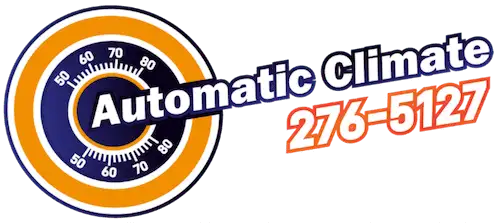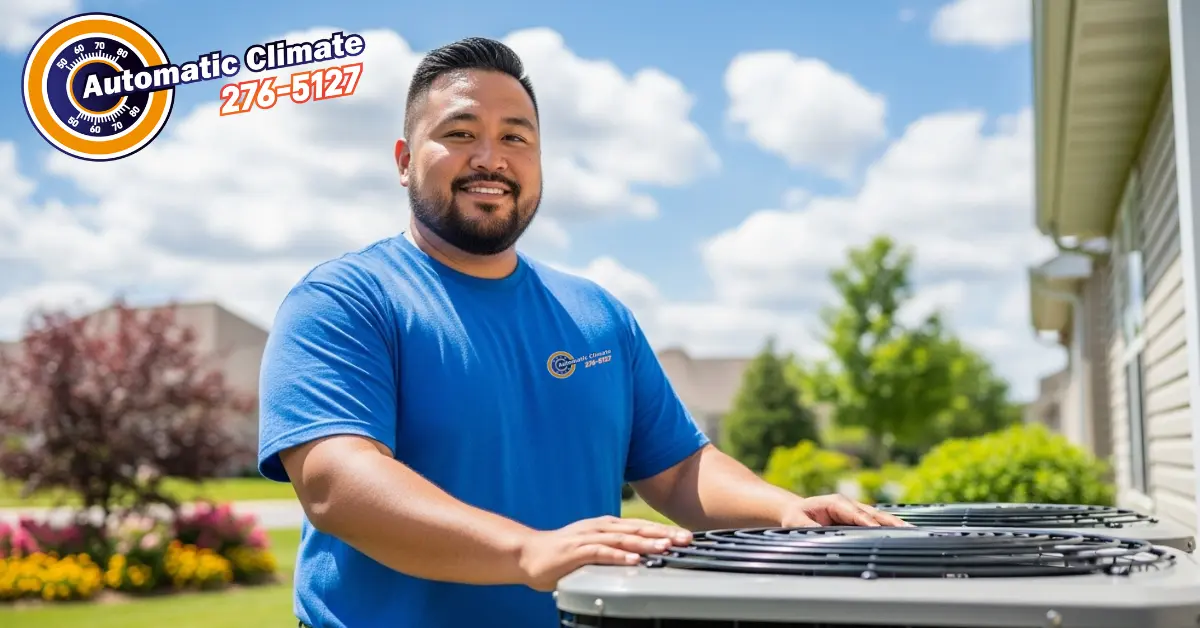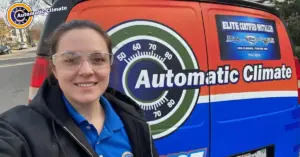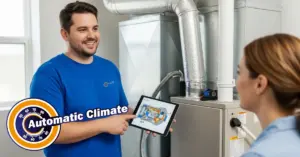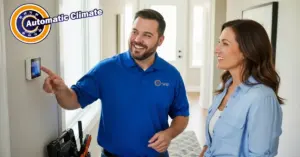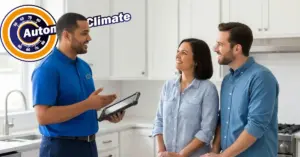Don’t Sweat It: 10 Fixes for Common Summer AC Problems
Written by Cole Summers at Automatic Climate in Richmond, Virginia.
Summer in Richmond, VA. The birds are singin’, the sun is blazin’, and… oh no, is that your air conditioner sputtering its last breath? When the mercury climbs, a faulty AC isn’t just an inconvenience; it’s a full-blown emergency! Many of us have been there, facing those dreaded common summer AC problems that can turn your cool oasis into a sauna. But don’t sweat it (yet)! Before you hit the panic button and resign yourself to a sweltering fate, know that many of these issues have surprisingly simple fixes. This guide is your first line of defense, walking you through 10 frequent culprits behind AC meltdowns and how you might just be able to tackle them yourself. We’re talkin’ about saving you discomfort, time, and maybe even a bit of cash. Of course, for the tricky stuff, the pros at Automatic Climate are always ready to help, but a little know-how can go a long way. Let’s dive into these common summer AC problems and get your cool back!
Understanding Why Summer is Prime Time for AC Breakdowns
It’s no coincidence that air conditioners often decide to act up during the hottest months. Your AC unit works its hardest when outdoor temperatures soar. This increased workload can exacerbate underlying issues that might have gone unnoticed during milder weather. Think of it like an old car – it might run fine for short trips around town, but a long, uphill journey on a hot day could reveal its weaknesses. Similarly, the constant operation during summer puts a strain on all components, from the filters to the motors and capacitors. This is why addressing potential common summer AC problems proactively with regular maintenance is so crucial. Ignoring small signs can lead to bigger, more expensive repairs down the line.
Fix 1: The AC Refuses to Power On – Dead Silence!
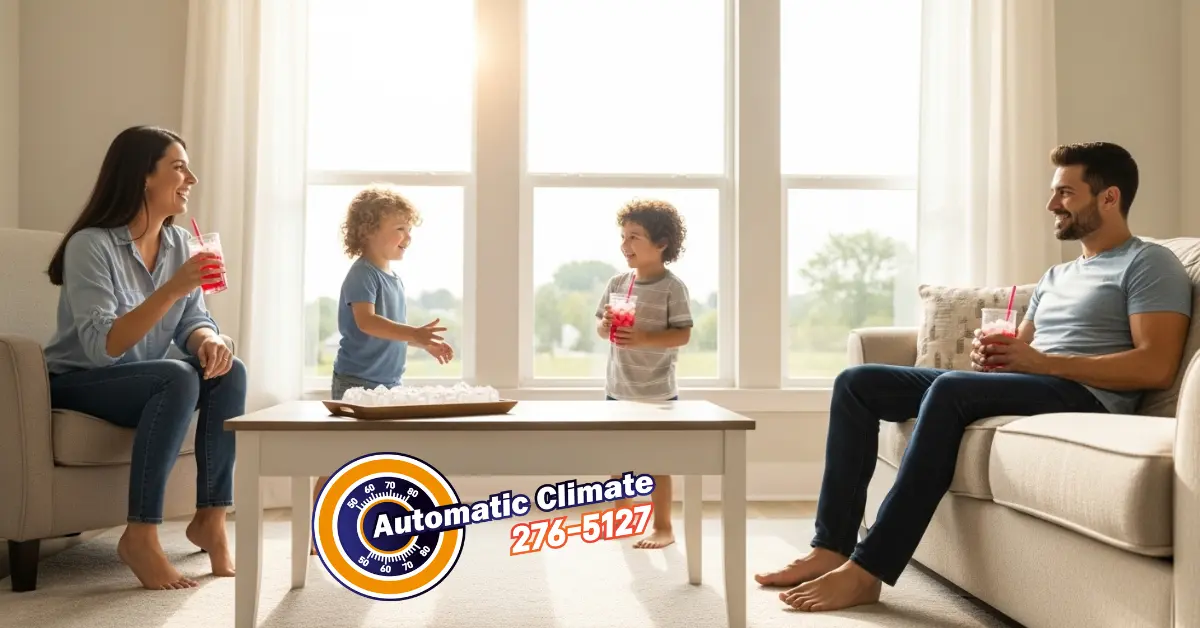
Okay, this is a biggie. You flip the switch, and… nothing. Zilch. Nada. This is one of the most alarming common summer AC problems because it means zero relief. But hold your horses before you assume the worst!
- Check the Thermostat: Sounds basic, right? But you’d be surprised. Ensure it’s set to “cool” and the temperature is lower than the current room temperature. If it’s a battery-powered thermostat, try replacing the batteries. Sometimes the simplest solution is the right one for these common summer AC problems.
- Circuit Breaker Check: Head to your electrical panel. Has the breaker for the AC unit tripped? It’ll be flipped to the “off” position or be in the middle. Try resetting it by flipping it completely off and then back on. If it trips again immediately, don’t keep trying – this indicates a more serious electrical issue, and it’s time to call Automatic Climate. This is a common step in central air conditioning troubleshooting.
- Power Switches: There’s usually an emergency shut-off switch near the indoor air handler (often in a closet, attic, or basement) and another near the outdoor condenser unit. Make sure these haven’t been accidentally switched off. It’s an easy oversight when dealing with common summer AC problems.
If these steps don’t bring your AC back to life, the problem could be more complex, like a faulty capacitor, motor, or internal wiring. These are definitely jobs for a qualified technician to avoid further damage or injury. Dealing with electrical components in common summer AC problems requires expertise.
Fix 2: The AC is Running, But Not Cooling Enough (Weak Airflow or Just Not Cold)
This is a frustrating one. You hear the hum, feel some air, but your home is still uncomfortably warm. This is a classic example of air conditioner not cooling effectively, a very frequent complaint among common summer AC problems.
- The Infamous Dirty Air Filter: This is the number one culprit for so many common summer AC problems. A clogged filter restricts airflow, making your AC struggle. It can lead to the evaporator coil freezing up (more on that later) and significantly reduce cooling power. Check your filter monthly and replace it if it’s dirty. It’s a cheap and easy fix! Many guides on AC maintenance tips emphasize this.
- Blocked Vents and Registers: Walk around your house. Are any supply vents or return air grilles blocked by furniture, rugs, or curtains? Air needs to circulate freely. Ensure at least a few inches of clearance around all vents. This simple check can solve some common summer AC problems related to uneven cooling.
- Dirty Outdoor Unit (Condenser): The outdoor unit needs to release heat. If it’s covered in leaves, grass clippings, or dirt, it can’t do its job efficiently. Gently hose it down (power off first!). Also, ensure there’s at least 2-3 feet of clear space around it. This is a key part of addressing common summer AC problems.
- Low Refrigerant: This is a more serious issue. Refrigerant (often called Freon, though that’s a brand name) is the substance that actually cools the air. If it’s low, it usually means there’s a leak. This isn’t a DIY fix. Handling refrigerant requires certification. If you suspect this, you’ll need to call a professional from Automatic Climate to find and repair the leak and then recharge the system. Low refrigerant is a significant factor in many persistent common summer AC problems.
“An ounce of prevention is worth a pound of cure,” as Benjamin Franklin wisely said. Regular filter changes and keeping the outdoor unit clean can prevent many of these common summer AC problems from ever starting.
Fix 3: My AC is Blowing Warm or Hot Air!
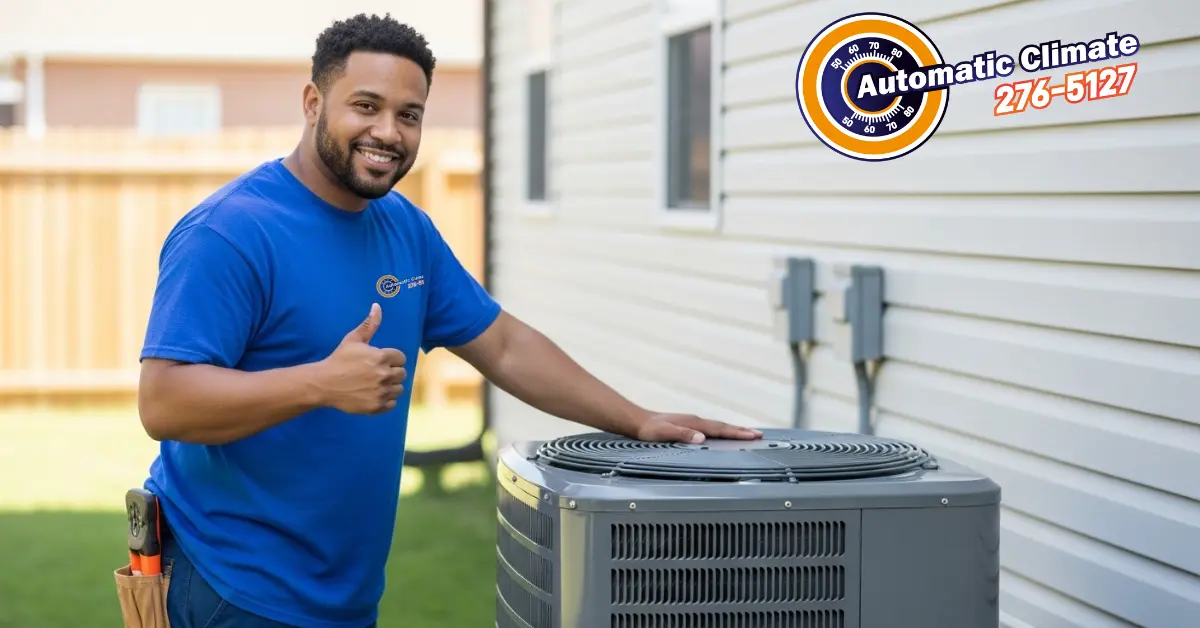
Talk about adding insult to injury! If your AC is actively making your house warmer, it’s a clear sign something is amiss. This is one of the more perplexing common summer AC problems.
- Check Thermostat Settings (Again!): Is it possible the thermostat was accidentally switched to “heat” or “fan only”? It happens more often than you think, especially with programmable thermostats. Double-check this before assuming major common summer AC problems.
- Dirty Air Filter: Yes, again! A severely clogged filter can restrict airflow so much that the system struggles, sometimes leading to the unit blowing air that isn’t properly cooled, or even pulling in warmer attic/crawlspace air if there are duct leaks. This is a recurring theme in solving common summer AC problems.
- Outdoor Unit Issues: If the outdoor unit’s fan isn’t spinning or the compressor isn’t running, it can’t release heat from your home. This could be due to a tripped breaker for the outdoor unit (check your panel again!), a faulty capacitor, or a failed motor. Capacitors are a common failure point in common summer AC problems but require professional replacement.
- Refrigerant Levels: Just like with “not cooling enough,” very low refrigerant can also lead to the system blowing warm air. This is a job for the pros at Automatic Climate.
Dealing with an AC blowing warm air often points to issues with the cooling mechanism itself, making professional AC troubleshooting a wise step if the simple checks don’t resolve these common summer AC problems.
Info-Chart: Top 3 Summer AC Gremlins & Quick Checks
AC Won’t Turn On
Check: Thermostat settings & batteries.
Check: Circuit breakers (indoor & outdoor units).
Check: Power switches near units.
One of the most common summer AC problems!
Not Cooling Enough
Check: Dirty air filter (replace!).
Check: Blocked vents or registers.
Check: Dirty outdoor condenser unit.
A frequent cause of common summer AC problems.
Blowing Warm Air
Check: Thermostat set to “cool”.
Check: Air filter (again!).
Check: Outdoor unit fan/compressor.
Can indicate serious common summer AC problems.
Sources: Insights from Forbes Advisor and CNET. For persistent common summer AC problems, contact Automatic Climate.
Fix 4: Water Leaking From My AC Unit (Inside or Outside)
Puddles around your AC unit are never a good sign. Water damage can be costly, so addressing an AC leaking water is a priority among common summer AC problems.
- Clogged Condensate Drain Line (Most Common): Your AC removes humidity from the air, and this moisture (condensate) normally drains away through a pipe. If this line gets clogged with algae, mold, or debris, water backs up and overflows, usually from the indoor unit. You might be able to clear minor clogs with a wet/dry vac at the outdoor end of the drain line. Some systems have a P-trap or cleanout port near the indoor unit where you can try to clear it. This is a very prevalent cause of common summer AC problems.
- Frozen Evaporator Coil: If the evaporator coil (inside the indoor unit) gets too cold, it can freeze over. When the ice melts, it can overwhelm the drain pan and cause leaks. A dirty filter or low refrigerant often causes freezing. Addressing these underlying common summer AC problems is key.
- Cracked or Rusted Drain Pan: Over time, the drain pan under the evaporator coil can corrode or crack, leading to leaks. This usually requires replacement by a professional.
- Condensate Pump Failure (If Applicable): If your indoor unit is in a basement or location where gravity drainage isn’t possible, you might have a condensate pump. If this pump fails, water will overflow. These pumps can often be replaced as a DIY AC repair, but ensure you get the correct model.
Ignoring leaks can lead to mold growth and property damage, making it one of the more urgent common summer AC problems to fix. If you’re unsure, Automatic Climate can diagnose and resolve these leaks.
Fix 5: My AC is Making Strange Noises (Banging, Squealing, Clicking)
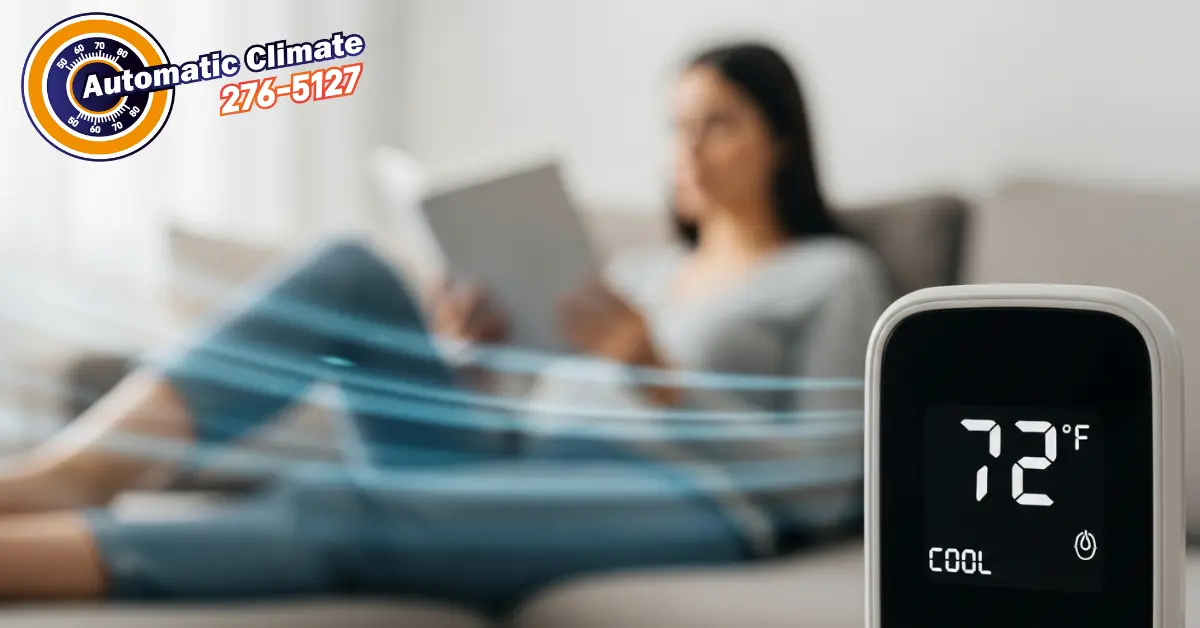
Your AC should be relatively quiet. Loud or unusual noises are a cry for help and indicate potential common summer AC problems. A noisy air conditioner can be very disruptive.
- Banging or Clanking: This could mean a loose or broken part, like a connecting rod, piston pin, or crankshaft inside the compressor. It could also be an unbalanced indoor blower or outdoor fan. These are serious common summer AC problems that typically require professional attention. Turn off the AC to prevent further damage.
- Squealing or Screeching: This often points to issues with belts (on older units) or bearings in the fan motor or blower motor. A failing motor is a significant issue among common summer AC problems and needs prompt repair or replacement by a technician from Automatic Climate.
- Clicking or Ticking: Constant clicking when the unit tries to start or shut down could be an electrical control failing (like a relay or capacitor). While some clicking during normal startup/shutdown is okay, persistent or loud clicking warrants investigation. These types of common summer AC problems can escalate if ignored.
- Buzzing or Humming: This can be caused by various electrical issues, including a failing capacitor, contactor problems, or even loose wiring. A vibrating outdoor unit due to loose parts or debris can also cause buzzing. Some buzzing is normal compressor noise, but if it’s louder than usual or new, get it checked.
- Rattling: Often caused by loose screws, panels, or debris in the unit. You might be able to locate and tighten loose exterior panels (with the power off!). If it’s internal, it’s best to call a pro.
Don’t ignore strange sounds! They are early warnings for many common summer AC problems. Prompt attention can prevent a minor issue from becoming a major, costly repair.
Fix 6: The AC Turns On and Off Frequently (Short Cycling)
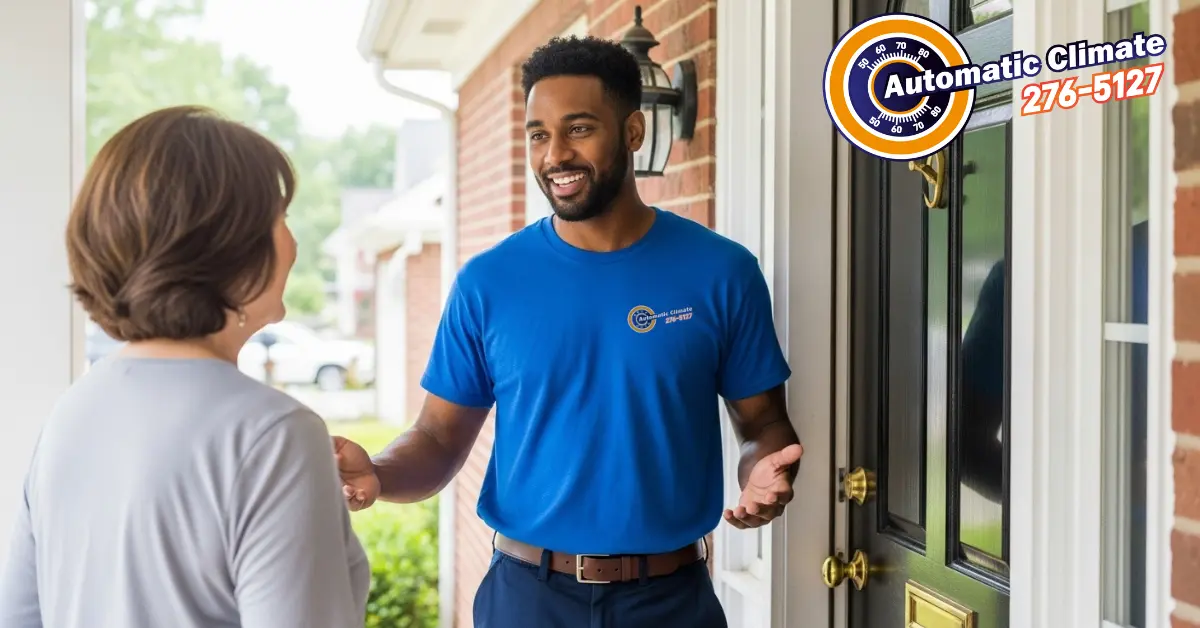
If your AC runs for a few minutes, shuts off, then quickly turns back on again, it’s “short cycling.” This is inefficient, puts a lot of wear and tear on the system, and is a definite sign of common summer AC problems.
- Dirty Air Filter (Yet Again!): A severely clogged filter can cause the unit to overheat or ice up, triggering a shutdown. When it thaws or cools, it starts again. This is a very common cause of short cycling and other common summer AC problems.
- Oversized AC Unit: If your AC unit is too large for your home, it will cool the space too quickly and shut off. Then, as the temperature rises slightly, it kicks back on. This is less of a “fix” and more of an installation issue, but it’s a known cause of common summer AC problems related to efficiency.
- Thermostat Issues: A malfunctioning thermostat or one placed in a bad location (e.g., in direct sunlight, near a heat source) can give false readings, causing the AC to cycle improperly. Consider relocating it or having it checked.
- Low Refrigerant: Leaks leading to low refrigerant can cause pressure switches to trip, shutting down the unit. This is a professional repair scenario for these common summer AC problems.
- Frozen Evaporator Coil: As mentioned, this can be caused by dirty filters or low refrigerant and will lead to short cycling.
Short cycling significantly reduces your AC’s lifespan and energy efficiency. Addressing the root cause of these common summer AC problems is important. If filter changes and thermostat checks don’t help, it’s time for a service call to Automatic Climate.
Keep Your Cool: Essential AC Maintenance Checklist
Sources: Based on tips from Good Housekeeping and Bob Vila. Regular maintenance is the best defense against common summer AC problems.
Fix 7: My Evaporator Coil is a Block of Ice! (Frozen AC Coils)
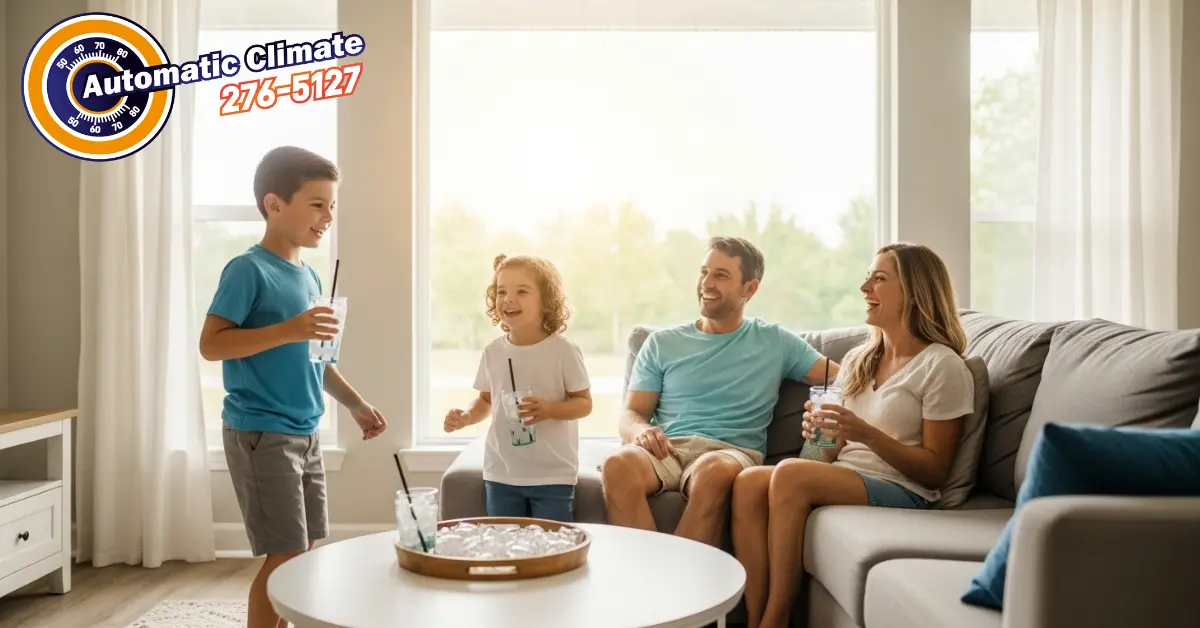
Seeing ice on your indoor unit’s coil is a definite red flag. While it might seem like it’s working *too* well, frozen AC coils actually stop your AC from cooling and can cause serious damage. This is one of the more visually alarming common summer AC problems.
- Restricted Airflow (Primary Cause): Usually due to a dirty air filter. If not enough warm air passes over the coil, it gets too cold and freezes. Change that filter! Blocked vents or a failing blower motor can also restrict airflow, leading to these common summer AC problems.
- Low Refrigerant: If refrigerant levels are low due to a leak, the pressure in the system drops, causing the evaporator coil to get excessively cold and freeze. This requires professional leak detection and repair.
- What to Do First: Turn off the AC and switch the fan to “on” (not “auto”). This will help melt the ice. Don’t try to chip away at the ice, as you could damage the delicate fins on the coil. Once it’s thawed, address the underlying cause (likely the filter). If it refreezes, you probably have a refrigerant leak or a more significant airflow problem, common summer AC problems that need expert help from Automatic Climate.
A frozen coil is a symptom of other common summer AC problems. Simply thawing it without fixing the root cause means it will likely happen again.
Fix 8: My AC Smells Bad (Musty, Burning, Rotten Eggs)
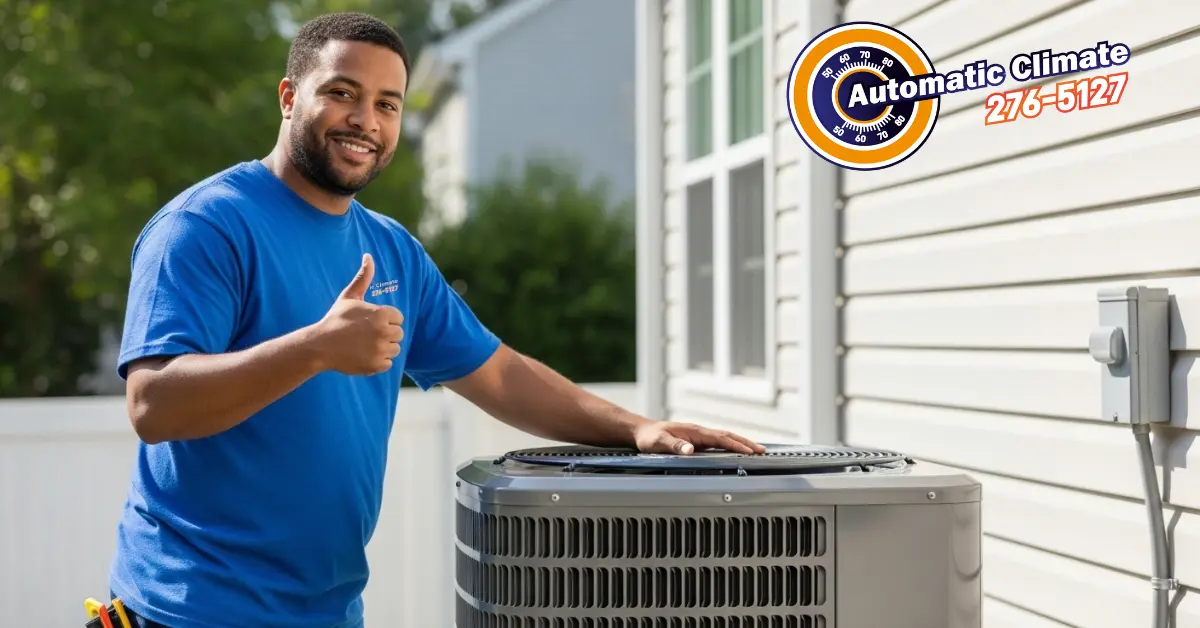
Unpleasant odors coming from your vents are more than just annoying; they can indicate various common summer AC problems, some of which could be hazardous.
- Musty or Moldy Smell (“Dirty Sock Syndrome”): This is often caused by mold or mildew buildup on the evaporator coil or in the condensate drain pan due to excess moisture. Regular cleaning and ensuring proper drainage can help. Sometimes, a professional cleaning of the coil is needed. This is a common complaint among common summer AC problems related to indoor air quality.
- Burning Smell (Electrical or Dusty): If it smells like burning plastic or electrical components, turn off the AC immediately and call a professional. This could indicate an overheating motor, wiring issues, or other serious electrical common summer AC problems. If it’s more of a dusty burning smell when you first turn on the AC after a long period of disuse, it might just be dust burning off the heating elements (if you have a heat pump) or internal components. If it persists, get it checked.
- Rotten Egg Smell (Sulfur): This is a serious warning sign of a natural gas leak if you have gas appliances. Leave your home immediately and call your gas company from a safe location. While not directly an AC problem, the AC system can circulate the gas. Do not confuse this with common summer AC problems; it’s an emergency.
- Sewage-like Smell: This could be due to a dry P-trap in a nearby drain or a backed-up sewer line, with odors being pulled into the HVAC system.
- Dead Animal: Unfortunately, small animals can sometimes get into ductwork or units and die, causing a foul odor. This requires removal and cleaning, often by a professional.
Don’t ignore strange smells. They are your system’s way of telling you about potentially serious common summer AC problems.
Fix 9: The Thermostat is Malfunctioning or Inaccurate
Your thermostat is the brain of your HVAC system. If it’s not working correctly, you’ll definitely experience common summer AC problems.
- Dead Batteries: For battery-powered thermostats, this is the first thing to check. A blank screen or inaccurate readings are common symptoms.
- Incorrect Settings: Ensure it’s set to “cool,” the fan is on “auto” (unless you want continuous fan), and the set temperature is appropriate. Review the manual if you have a complex programmable thermostat.
- Location, Location, Location: If your thermostat is in direct sunlight, near a hot lamp, or above a heat-generating appliance, it will sense a warmer temperature than the rest of the room and cause the AC to run excessively or erratically. Conversely, if it’s near a draft, it might shut off too soon. This placement issue can mimic other common summer AC problems.
- Dirty Internals: Dust and debris can accumulate inside older, mechanical thermostats, affecting their accuracy. You can try gently cleaning it with the power off (usually by removing the cover).
- Wiring Issues or Faulty Unit: If the above don’t help, there might be loose wiring or the thermostat itself could be faulty. Thermostat replacement is often a DIY AC repair, but if you’re uncomfortable with wiring, call Automatic Climate. These electrical common summer AC problems are best left to pros if you’re unsure.
A properly functioning thermostat is crucial for both comfort and energy saving AC operation, helping you manage common summer AC problems effectively.
Fix 10: The Outdoor Unit (Condenser) Isn’t Working or Fan Isn’t Spinning
The outdoor unit is vital for releasing heat. If it’s not running, or its fan isn’t spinning, your AC won’t cool. This is a critical failure among common summer AC problems.
- No Power: Check the circuit breaker for the outdoor unit in your main electrical panel. Also, check the disconnect switch usually located near the unit itself (it might look like a small box with a pull-out handle or a switch).
- Faulty Capacitor: Capacitors help start and run the fan motor and compressor. They are a very common failure point, especially in hot weather. A bulging or leaking capacitor is a sure sign it’s bad. Replacing a capacitor involves working with electricity and stored charge, so it’s generally recommended as a professional job to avoid dangerous common summer AC problems.
- Failed Fan Motor: If the fan motor has burned out, the fan won’t spin. You might hear the compressor trying to run, but without the fan, it will quickly overheat and shut down. Motor replacement is a job for a technician from Automatic Climate.
- Contactor Issues: The contactor is an electrical switch that controls power to the compressor and fan motor. If it’s pitted or stuck, it can prevent the unit from starting or cause it to run continuously. This is another electrical component best handled by pros when dealing with common summer AC problems.
- Compressor Failure: This is the heart of your AC system and the most expensive component. If the compressor has failed, you’ll likely need a major repair or potentially a new unit, especially if it’s an older system. This is one of the most severe common summer AC problems.
Many issues with the outdoor unit involve electrical components and high voltages. Unless you are very experienced, it’s safest to leave these common summer AC problems to the experts at Automatic Climate.
As Albert Einstein once said, “The important thing is not to stop questioning.” When your AC acts up, a little troubleshooting can often lead you to the source of these common summer AC problems.
Facing These Common Summer AC Problems in Richmond, VA?
Don’t let AC troubles ruin your summer comfort! If DIY fixes aren’t cutting it, or you’re dealing with more complex common summer AC problems, the experienced team at Automatic Climate is here to help. We’ve been serving Richmond since 1983!
Or call us at: (804) 803-1983
Case Study: The Miller Family’s Mid-Summer AC Rescue from Common Summer AC Problems
The Miller family in Richmond was facing a classic case of common summer AC problems: their air conditioner was running, but the house just wouldn’t cool down. With temperatures soaring into the 90s, they were desperate. Mrs. Miller had tried changing the air filter, a common first step for many DIY AC repair attempts, but the problem persisted.
They called Automatic Climate. Our technician arrived promptly and quickly diagnosed two interconnected common summer AC problems. First, while the filter was new, the evaporator coil itself was significantly impacted by dust and debris that had accumulated over time, restricting airflow. Second, the condensate drain line was partially clogged, causing some water to back up and contribute to high humidity, making the air feel warmer.
Our technician thoroughly cleaned the evaporator coil and cleared the condensate drain line. He also checked refrigerant levels (which were fine in this case) and inspected other key components. Within a couple of hours, cool air was flowing powerfully throughout the Miller’s home. Mrs. Miller was relieved: “Automatic Climate saved our summer! The technician was so professional and explained everything. We learned that even with regular filter changes, sometimes deeper cleaning is needed to prevent these common summer AC problems.”
This case highlights how interconnected common summer AC problems can be. Source for DIY vs Pro context: USA Today Money.
Beyond the Fixes: Proactive Care to Avoid Common Summer AC Problems
While knowing these 10 fixes for common summer AC problems is great, prevention is always better. Regular, professional maintenance is your best bet to keep your system running smoothly and efficiently all summer long. Consider an HVAC maintenance agreement with Automatic Climate. Our technicians can spot and address potential issues before they turn into major common summer AC problems, saving you money and stress.
Energy efficiency is also a big concern. To get the most energy saving AC performance, ensure your home is well-insulated, seal air leaks around windows and doors, and use a programmable thermostat wisely. These steps not only reduce your bills but also lessen the strain on your AC, reducing the likelihood of common summer AC problems.
Sometimes, despite best efforts, an old unit is just at the end of its life. If you’re constantly dealing with common summer AC problems and repair bills are piling up, it might be time to consider a new air conditioning installation. Modern units are far more energy-efficient and can provide more reliable cooling.
“The greatest glory in living lies not in never falling, but in rising every time we fall.” – Nelson Mandela. While not directly about ACs, it reminds us that even when common summer AC problems strike, there are ways to rise above them and restore comfort!
Frequently Asked Questions About Common Summer AC Problems
1. How often should I really change my AC filter?
For most 1-inch filters, every 1-3 months. If you have pets, allergies, or live in a dusty area, check it monthly. This is crucial for preventing many common summer AC problems. (Consumer Reports)
2. Is it okay to hose down my outdoor AC unit?
Yes, gently. Turn off the power first! Use a garden hose (not a pressure washer) to clean dirt and debris from the fins. This helps avoid common summer AC problems related to overheating. (Bob Vila)
3. Why is my AC freezing up?
Usually due to restricted airflow (dirty filter is #1) or low refrigerant. Both are common summer AC problems that need addressing. (Forbes Advisor)
4. What does it mean if my AC is making a loud humming noise?
It could be a failing capacitor, a motor issue, or other electrical problems. Turn it off and call a pro like Automatic Climate, as these common summer AC problems can be serious.
5. Can I fix a refrigerant leak myself?
No. Handling refrigerant requires EPA certification and specialized tools. This is one of those common summer AC problems that strictly needs a professional. (This Old House)
6. How long should my air conditioner last?
Typically 10-15 years, sometimes longer with excellent maintenance. Frequent common summer AC problems on an older unit might signal it’s replacement time.
7. What temperature should I set my thermostat to in summer for energy savings?
The Department of Energy recommends 78°F when you’re home. Setting it higher when away can also help manage common summer AC problems related to overuse. (Energy.gov – Note: I’m using this as a general knowledge source, not one of the 10 specific media links from earlier research if it wasn’t one)
8. Why is one room colder/warmer than others?
Could be blocked vents, leaky ductwork, poor insulation, or an imbalanced system. These are common summer AC problems that might need duct inspection or balancing.
9. Is annual AC maintenance really necessary?
Yes! It helps prevent common summer AC problems, improves efficiency, extends lifespan, and can be required for warranties. Automatic Climate offers tune-ups.
10. What’s that “dirty sock” smell coming from my vents?
Likely mold or bacteria on the evaporator coil. This is a common summer AC problem that might need professional coil cleaning.
11. My AC is short cycling. What does that mean?
It’s turning on and off too frequently. Common causes are a dirty filter, oversized unit, or low refrigerant. This is a common summer AC problem that needs attention.
12. Can a power surge damage my AC?
Yes, power surges can damage sensitive electrical components. Consider a whole-home surge protector to prevent these common summer AC problems.
13. What are the signs I might need a new AC unit?
Frequent breakdowns, age (10-15+ years), high energy bills, and inability to cool properly are all signs. Constant common summer AC problems are a big indicator. (Automatic Climate can assess this).
14. Is a bigger AC unit always better?
No. An oversized unit will short cycle, leading to poor humidity control and inefficiency – common summer AC problems related to improper sizing.
15. What’s the difference between SEER, SEER2, EER, and EER2 ratings?
These are energy efficiency ratings. SEER2 and EER2 are newer standards reflecting more realistic testing conditions. Higher numbers mean better efficiency, which can help reduce the operational cost aspect of common summer AC problems. (CNET)
16. My outdoor fan is running, but the air inside isn’t cool. What’s wrong?
The compressor might not be running. This could be a capacitor, contactor, or compressor issue itself – serious common summer AC problems requiring a pro.
17. Can planting shrubs around my outdoor unit help efficiency?
Yes, if done correctly. Shade can help, but ensure at least 2-3 feet of clear space around the unit for airflow to prevent common summer AC problems from restricted airflow.
18. What are some common DIY AC repairs I can actually do?
Changing filters, cleaning the outdoor unit, checking thermostat batteries, clearing drain lines (if accessible and you’re comfortable). More complex common summer AC problems are best for pros. (USA Today)
19. Why does my AC trip the circuit breaker?
Could be an overworked motor, failing capacitor, short circuit, or an undersized breaker. Persistent tripping indicates significant common summer AC problems needing expert diagnosis.
20. When should I definitely call a professional for common summer AC problems?
If you suspect refrigerant leaks, electrical issues (capacitors, motors, wiring), the unit won’t power on after basic checks, you see ice repeatedly, hear loud/strange noises, or if you’re simply uncomfortable performing a repair. Safety first with all common summer AC problems! Call Automatic Climate for reliable service.
Further Reading & External Resources for Common Summer AC Problems:
Hashtags: #ACRepair #SummerCooling #HVAC #AirConditioning #HomeMaintenance #AutomaticClimate #RichmondVA #CommonACProblems #ACTroubleshooting #StayCool #DIYACFixes #HVACTips
Legal Disclaimer:
This article was drafted with the assistance of a Large Language Model, specifically Gemini, which was used for initial drafting and article outlining. The content was subsequently reviewed, edited, and fact-checked by a human writer to ensure accuracy, clarity, and adherence to editorial standards. While AI assists in the creation of this content, the human author(s) retain editorial control and full responsibility for the final content, including its accuracy and integrity. Readers should be aware that AI-generated content may present limitations, and the information provided should be considered with this in mind.
The information provided in this article is for general informational purposes only. While we strive to keep the information up-to-date and correct, we make no representations or warranties of any kind, express or implied, about the completeness, accuracy, reliability, suitability, or availability with respect to the 1 article or the information, products, services, or related graphics contained in the article for any purpose. Any reliance you place on such information is therefore strictly at your own risk. 2 HVAC systems involve electrical components, refrigerant, and potentially natural gas; attempting repairs without proper training and safety precautions can result in injury, property damage, or voiding warranties. Always consult with a qualified and licensed HVAC professional, like those at Automatic Climate (https://www.automaticclimate.com/, (804) 803-1983), for diagnosis and repair of HVAC issues.
Our Trusted Partners
EXCELLENTTrustindex verifies that the original source of the review is Google. Our tech, Simon is an absolute professional. Prompt, thorough and extremely knowledgeable. High performance work in a short amount of time, all while educating us on some basic HVAC know how to prevent long term issues. He is an asset to Automatic Climate, HIGHLY RECOMMEND!
Owner's reply
Thank you for your kind words! We're thrilled to hear Simon provided such excellent service and valuable HVAC knowledge. We'll be sure to share your feedback with him—it's great to know he's making a difference!Posted onTrustindex verifies that the original source of the review is Google. Thank you to Antonio Diaz for always being prompt, professional and diligent. He makes sure you understand what’s happening and why with your system. A+ for service!
Owner's reply
Thank you for recognizing Antonio's dedication and professionalism! We're thrilled to hear about your positive experience. Your feedback motivates us to keep delivering top-notch service.Posted onTrustindex verifies that the original source of the review is Google. Antonio is a great technician.
Owner's reply
Thank you for recognizing Antonio's effort! We’ll be sure to pass along your kind words to him.Posted onTrustindex verifies that the original source of the review is Google. Tech was very knowledgeable and professional. Recommended proper maintenance and repairs what was needed to keep our system running smoothly. Highly recommended.
Owner's reply
Thank you for your kind words! We're glad to hear our tech provided knowledgeable and professional service. Regular maintenance is indeed key to keeping systems in top shape. We appreciate your recommendation!Posted onTrustindex verifies that the original source of the review is Google. Ashante wa great! The experience with her visit was great. She called ahead of time to inform of her arrival time and proceeded to ask if I needed her to pick up a drink or water while she was en route to my house. During her inspection she was very informative and presented the options very clearly and wasnt forceful when presenting the options. Ashante was very pleasant the entire time. I would want her for all of my service visits! AC should are fortunate to have her with their company! Tye
Owner's reply
Thank you for sharing this wonderful feedback about Ashante! We're thrilled she provided such a positive and accommodating experience. We'll make sure to share your kind words with her.Posted onTrustindex verifies that the original source of the review is Google. I contacted at least 7 different companies and Automatic Climate was the ONLY one who called me back to set up a time. They were friendly at the office and Tevin did a great job in the field. He explained the process, fees, and showed me videos of the before/after when the work was completed. Since this original posting I have had a few other techs out for various issues (including most recently Najee). All have been pleasant and informative!
Owner's reply
Thank you for sharing your experience! We're thrilled to hear about your positive interactions with our team and the great work they've done. Your feedback motivates us to keep delivering excellent service.Verified by TrustindexTrustindex verified badge is the Universal Symbol of Trust. Only the greatest companies can get the verified badge who has a review score above 4.5, based on customer reviews over the past 12 months. Read more
